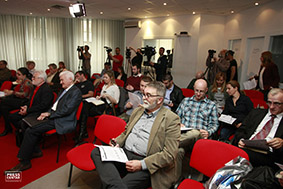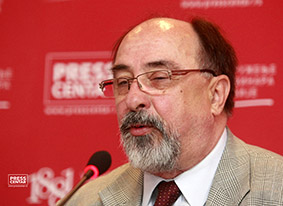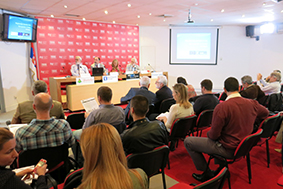 Summary:
Summary:
On May 12, 2016, a conference "Corruption in Serbia today" was held in organization of Center for Liberal-Democratic Studies (CLDS), who is a member of the regional network SELDI (South East Leadership for Development and Integrity). The reason for the discussion was the new report on the trends of corruption in Serbia, which is based on a survey conducted in February 2016.
The conference brought together representatives of civil society, public sector and expert community, in order to discuss the results and policy recommendations in the light of recent developments in Europe and in the region. The conference also highlighted efforts, current work and the major issues of the future work of civil society in fight against corruption in South Eastern Europe.
Basic research findings were presented by Professor Boris Begovic from CLDS. Almost 20% of Serbian citizens acknowledged that they directly or indirectly were asked to pay bribe to public officials. However, this result shows an improvement of almost 10 percentage points compared to the situation in 2014, which indicates that corruption pressure of public officials to citizens, has been reduced. This is in line with the long-term downward trend since 2001. Accordingly, the participation of citizens in corruption was also reduced in 2016. There is a significant drop of about 11 percentage points of the respondents who admitted giving bribes to public officials in relation to two years ago, as a full 30 percentage points decrease compared to the situation before 14 years. This is certainly a favorable trend, but it is, by Begovic, mostly a result of reduced contact between citizens and administration.
Dr. Bosko Mijatovic, a President of CLDS, talked about the systemic causes of corruption, especially from the perspective of the analysis of the energy sector. He talked about the dominance of state ownership in the energy sector, overriding the tenders in the construction of large objects through international agreements, the weaknesses in the management of public enterprises as well as in the work of "independent" regulatory and control bodies and the problems in the public procurement. He concluded his presentation by mentioning corruption scandals in energy sector that are left unresolved either due to uncompleted trials, or due to release of the doubt.
A member of the Board of The Anti-Corruption Agency Professor Zoran Stojiljkovic said that he believed that it was possible to live in a world without corruption or at least without systemic corruption. Serbia and countries in the region will not get out of the zone of the political corruption as long as they remain deficient, defective democracies, systems with a party state, with weak parliaments, the critical zone of hardly achievable independent acts of the justice sector, with the media being economically dependent on large advertisers, in societies that are sufficiently resistant to systemic corruption. He also said that the attitude of the authorities towards independent institutions is bad and that the government tends to push these institutions to the margins by such conduct.
A member of the Anti-Corruption Council Mrs. Jelisaveta Vasilic, a former judge, point out that the Council had no power to influence the government to change some things. She said that they wrote a lot of reports that were submitted to each government, but never received any feedback that would prove that someone even read those reports. Moreover, Council had a lot of difficulties in obtaining information, except in cases when they were supported by the Commissioner for Information of Public Importance. Vasilic sad that according the way Government treats the regulatory authorities, such as the Ombudsman, it is not surprising that the Council as an advisory body does not enjoy any respect. She also said that Council’s recommendations are not taken into account and that Serbia is not a state with the system of the rule of law.
Professor Zoran Ivošević presented a legal analysis of controversial cases - among other things, Belgrade waterfront project and the demolition in Savamala and stated their disastrous consequences.
Dr Drasko Karađinović, coordinator of the association "Doctors Against Corruption", talked about health care as the most corrupt sector.
Mr. Marko Milošević, from Office of Ombudsman of Serbia, talked about problems in communication between the Office and various governmental institutions.
Professor Ljubomir Madzar stressed the need to further reduce the role of government in economic life, while Nemanja Nenadic, Director of Transparency Serbia, talked about the shortcomings of the feasibility study on the basis of which a decision was made about the Chinese loan for investment in the power plant Kostolac.




www.seldi.net/









